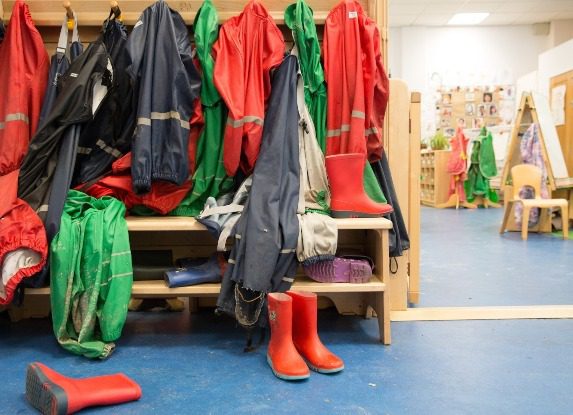Dr Susana Castro-Kemp reflects on the initial findings of her Froebel Trust funded research project. An article first published in Nursery World.
This article by Dr Susana Castro-Kemp (UCL Institute of Education) was first published on Wednesday 4 May 2022 in Nursery World. It was written in response to Ofsted's announcement that it would be increasing its focus on early-years education as part of its new five-year strategy.
The power imbalance between Ofsted inspectors and providers needs to go
We must be clear what the real issues are with the delivery of high-quality early childhood education and care and its assessment.
The move to a stronger focus on the early years comes as findings from a Nursery World survey show grave failures in the Ofsted inspection process.
These findings are well aligned with the preliminary results of the study conducted by my team at Roehampton University: in a set of interviews with nursery managers, most expressed profound dissatisfaction with the process adopted by Ofsted in their inspections.
Although all managers agree that an inspection procedure is necessary, most of them refer to a culture of fear in the current system. Interactions with Ofsted inspectors are characterised by a power imbalance.
Managers report that there is no attempt to build a constructive relationship between nurseries and inspectors, leaving them feeling like ‘they are trying to get us on something we’ve missed’, instead of working together to improve the quality of provision for the children.
Preliminary results from our study also suggest that children’s outcomes (as documented by the settings) are unrelated to the settings’ Ofsted ratings, rather they are associated with the socio-economic level of the settings’ postcode.
This is not new, and it has been interpreted by Ofsted as the result of the living challenges faced by the most deprived communities, making it more difficult for many of these children to achieve better results, and for the nurseries to engage with the community.
Although this is to some extent very true, it is also true that an inspection system that does not value constructive feedback and cooperative engagement in the quality enhancement process must be seen as responsible for perpetuating this trend.
Ofsted reports of ‘Outstanding’ nurseries in wealthy post codes often state children develop remarkably well and are very well prepared for school transition. How much of this is about the quality of the provision? As per Ofsted’s own statistics, probably very little.
And the reports tell us very little about these outstanding practices. An outstanding nursery is that which, despite being based in a deprived community, and regardless of the children’s outcomes, shows outstanding provision practices, based on what we know is gold standard. A nursery based in a wealthy postcode is expected to perform well in terms of children’s outcomes, before any assessment of its provision. This requires a complete change of vision within the Ofsted framework.
The proposal put forward by Ofsted of increasing the length of the inspections is welcome by managers interviewed in our study. Despite the overwhelming stress that an Ofsted inspection puts on managers and staff, there is consensus that increasing the length of the observations will make the process fairer and ultimately more accurate.
Indeed, one cannot assess how an organisation functions on a day-to-day basis by relying on a single data point or snapshot. However, this will continue to be insufficient and potentially turn out to be counterproductive if the issue of power imbalance is not fully addressed. Three-day inspections based on abusive and destructive interactions will be considerably more detrimental than the current system already is.
Ultimately, Ofsted needs to restructure its entire framework and: 1) train inspectors on humanistic communication and interaction, and 2) rely much more heavily on evidence-based practices of high-quality provision than it currently does.
In our analysis of nearly 200 Ofsted reports of early years providers, nationally, various issues were identified which are mostly incompatible with the idea of high-quality early childhood education and care.
For example, the reports show an over-reliance on literacy and numeracy outcomes and activities, rather than play-based engagement indicators, which have been widely regarded as better markers of healthy development and learning (e.g.Vitiello et al., 2012; Williford et al., 2013).
The analysis also shows clear inconsistencies in the inspectors’ understanding of what each quality indicator refers to, with quality statements literally taken from the inspectors’ manual and pasted against various quality criteria, interchangeably.
What we don’t read in these reports is a detailed account of the education and care practices demonstrated in the settings. Children’s outcomes are dependent on a multitude of factors. As widely recognised in developmental science, development is the result of biopsychosocial factors, continuously interacting over time (Bronfenbrenner, 2007).
No one (not even Ofsted) can say that children’s outcomes improve because of provision alone. But if we assess and promote good practice in a constructive and empathetic manner, it is much more likely that this will be the case.
Ofsted should aim to have an assessment framework and procedure that sets the example of balanced transdisciplinary work and evidence-based practice that they wish to see in early childhood education and care settings.
About the author
Dr Castro-Kemp is Associate Professor in Psychology and Special Needs at UCL Institute of Education, London. She's the principal investigator of the project Froebel meets Ofsted: What makes an 'outstanding' nursery? (funded by the Froebel Trust).

References
Vitiello, V. E., Booren, L. M., Downer, J. T., & Williford, A. P. (2012). Variation in children's classroom engagement throughout a day in preschool: Relations to classroom and child factors. Early Childhood Research Quarterly, 27(2), 210-220.
Williford, A. P., Vick Whittaker, J. E., Vitiello, V. E., & Downer, J. T. (2013). Children's engagement within the preschool classroom and their development of self-regulation. Early Education & Development, 24(2), 162-187.
Bronfenbrenner, U., & Morris, P. A. (2007). The bioecological model of human development. Handbook of child psychology, 1.


